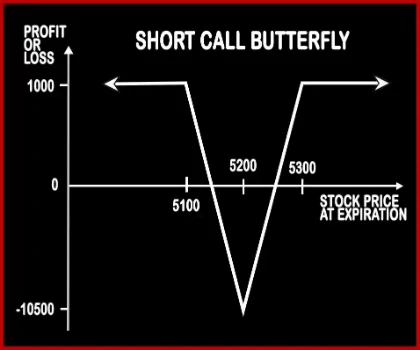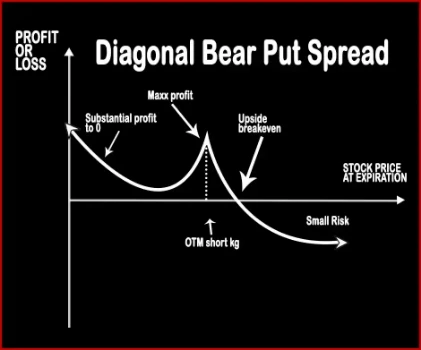Compare Strategies
| SHORT CALL BUTTERFLY | DIAGONAL BEAR PUT SPREAD | |
|---|---|---|

|

|
|
| About Strategy |
Short Call Butterfly Option StrategyThis strategy is opposite of the Long Call Butterfly Strategy, a trader expects the market to remain range bound in Long Call Butterfly, but here he expects the market to move beyond strike boundaries in Short Call Butterfly. If the trader is bullish on the market’s volatility, he will implement this strategy. Here also there should be equal distance between the |
Diagonal Bear Put SpreadWhen the trader is neutral – bearish in the near-month and bearish in the mid-month, he will apply Diagonal Bear Put Spread. This strategy involves buying Mid-Month ITM Put Options and selling (short/write) equal number of Near-Month OTM Put Options, of the same underlying asset. This strategy bags limited rewards with limited risk. |
SHORT CALL BUTTERFLY Vs DIAGONAL BEAR PUT SPREAD - Details
| SHORT CALL BUTTERFLY | DIAGONAL BEAR PUT SPREAD | |
|---|---|---|
| Market View | Neutral | Bearish |
| Type (CE/PE) | CE (Call Option) | PE (Put Option) |
| Number Of Positions | 4 | 2 |
| Strategy Level | Advance | Beginners |
| Reward Profile | Limited | Limited |
| Risk Profile | Limited | Limited |
| Breakeven Point | Lower Break-even = Lower Strike Price + Net Premium, Upper Break-even = Higher Strike Price - Net Premium | This is a dynamic trade with many possible scenarios and future trades, it is impossible to calculate a breakeven. |
SHORT CALL BUTTERFLY Vs DIAGONAL BEAR PUT SPREAD - When & How to use ?
| SHORT CALL BUTTERFLY | DIAGONAL BEAR PUT SPREAD | |
|---|---|---|
| Market View | Neutral | Bearish |
| When to use? | This strategy is meant for special scenarios where you foresee a lot of volatility in the market due to election results, budget, policy change, annual result announcements etc. | When the trader is neutral – bearish in the near-month and bearish in the mid-month, he will apply Diagonal Bear Put Spread. This strategy involves buying Mid-Month ITM Put Options and selling (short/write) equal number of Near-Month OTM Put Options, of the same underlying asset |
| Action | Buy 2 ATM Call, Sell 1 ITM Call, Sell 1 OTM Call | Sell 1 Near-Month OTM Put Option, Buy 1 Mid-Month ITM Put Option |
| Breakeven Point | Lower Break-even = Lower Strike Price + Net Premium, Upper Break-even = Higher Strike Price - Net Premium | This is a dynamic trade with many possible scenarios and future trades, it is impossible to calculate a breakeven. |
SHORT CALL BUTTERFLY Vs DIAGONAL BEAR PUT SPREAD - Risk & Reward
| SHORT CALL BUTTERFLY | DIAGONAL BEAR PUT SPREAD | |
|---|---|---|
| Maximum Profit Scenario | The profit is limited to the net premium received. | 'Premiums received - Initial premium to execute + Strike price - Stock Price on final month |
| Maximum Loss Scenario | Higher strike price- Lower Strike Price - Net Premium | When the stock trades up above the long-term put strike price. |
| Risk | Limited | Limited |
| Reward | Limited | Limited |
SHORT CALL BUTTERFLY Vs DIAGONAL BEAR PUT SPREAD - Strategy Pros & Cons
| SHORT CALL BUTTERFLY | DIAGONAL BEAR PUT SPREAD | |
|---|---|---|
| Similar Strategies | Long Straddle, Long Call Butterfly | Bear Put Spread and Bear Call Spread |
| Disadvantage | • Limited rewards, usually offer smaller return. • Profitability depends on the significant movement of stocks and options prices. | Higher commissions due to additional trades. , Changes maximum profit potential of call or put spreads. |
| Advantages | • Even if the market is highly volatile, the risk exposure remains limited. • Without any extra investment, you can receive your premium. • Able to book profits even when the price movement cannot be predicted. | The Risk is limited. |